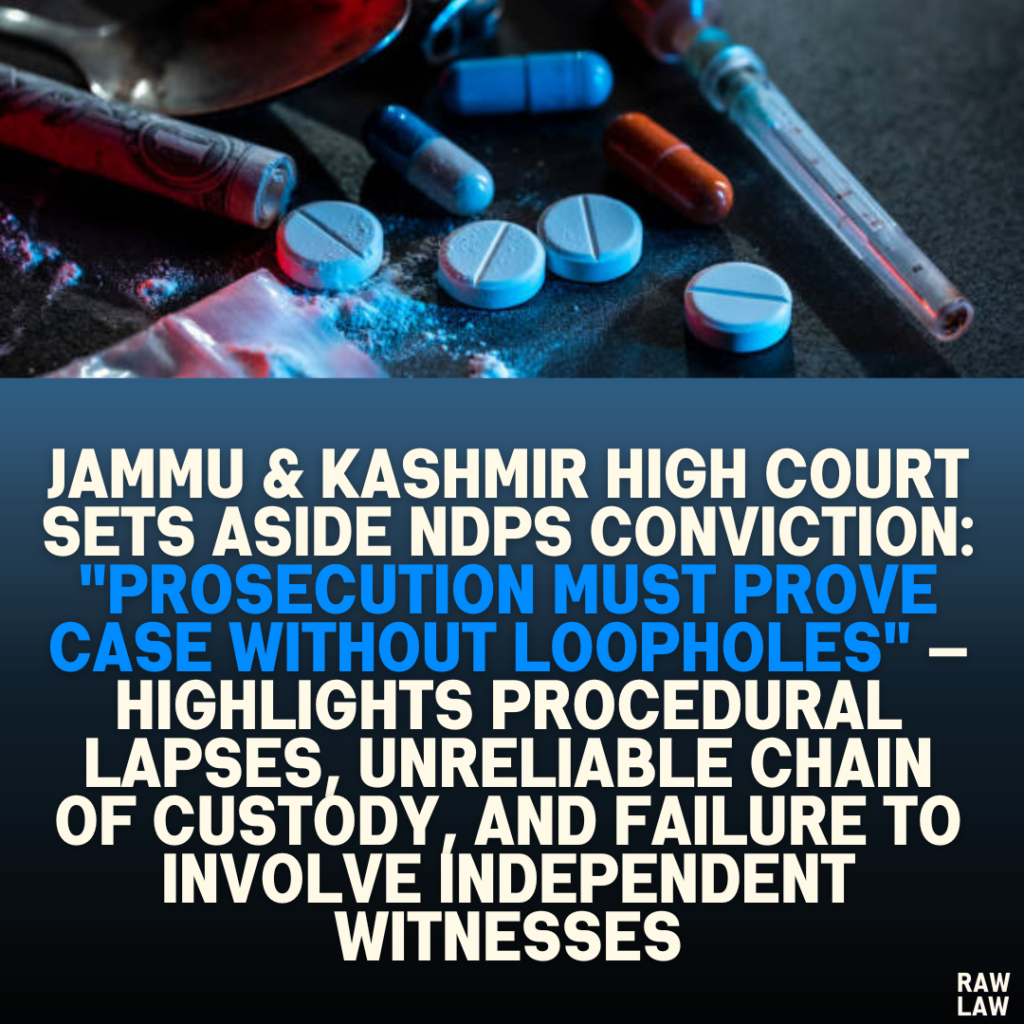Court’s Decision
The High Court of Jammu & Kashmir and Ladakh overturned the trial court’s conviction of the appellant under the Narcotic Drugs and Psychotropic Substances Act (NDPS Act), 1985. The trial court had sentenced the appellant to 12 years of rigorous imprisonment and a ₹2 lakh fine for possessing 10.840 kilograms of heroin. The High Court ruled that the prosecution failed to prove its case beyond a reasonable doubt, citing procedural irregularities in handling evidence and chain of custody concerns.
The court observed:
- “The NDPS Act provides for stringent punishment, and as such, the prosecution is under obligation to prove its case in such a manner that no loopholes remain.”
- The court concluded that these procedural lapses undermined the case, granting the appellant the benefit of the doubt and setting aside the conviction.
Facts
- Incident: On May 25, 2013, during a routine check at Kral Nullah, Kud, a Tavera taxi was stopped by CRPF personnel. A black bag in the appellant’s possession was found to contain ten yellow packets suspected to be heroin.
- Seizure and Investigation:
- SPO Vijay Kumar called the SHO, who registered an FIR and extracted samples from the seized packets for chemical analysis.
- Forensic examination confirmed the substance was heroin.
- Trial Court: The Principal Sessions Judge, Udhampur, convicted the appellant under Sections 8/22(c) of the NDPS Act based on the prosecution’s evidence and sentenced him.
Issues
- Did the prosecution prove the recovery of contraband from the appellant beyond a reasonable doubt?
- Was the chain of custody of the seized contraband and its samples properly maintained?
- Did procedural lapses in handling and presenting evidence render the conviction unsustainable?
Petitioner’s Arguments
- The prosecution failed to involve independent witnesses, including CRPF personnel and co-passengers, in the investigation.
- Discrepancies existed in the weight of the seized contraband and the forensic sample-handling process.
- The prosecution did not conclusively prove that the samples analyzed by the forensic laboratory were from the contraband recovered from the appellant.
- The trial court convicted the appellant based on insufficient and inconsistent evidence.
Respondent’s Arguments
- The prosecution maintained that the recovery of contraband was established through consistent witness testimony.
- Minor contradictions in evidence were argued to be inconsequential.
- The forensic report confirmed the seized material was heroin, justifying the trial court’s decision.
Analysis of the Law
1. Burden of Proof:
- Under the NDPS Act, a reverse burden of proof applies: once contraband is recovered, the accused must establish their innocence.
- However, the prosecution must first establish foundational facts, including recovery, chain of custody, and analysis, with no gaps in procedure.
2. Chain of Custody:
- Evidence must establish that the seized material remained untampered throughout its handling.
- The prosecution failed to produce or prove critical records like the Malkhana Register and Daily Diary Reports documenting the samples’ custody and transfer.
3. Precedent:
- In Hanif Khan v. Central Bureau of Narcotics (2020) 16 SCC 709, the Supreme Court highlighted that procedural lapses in NDPS cases can rebut the presumption of guilt under the reverse burden rule.
- In Noor Aga v. State of Punjab (2008) 16 SCC 417, the court emphasized that the prosecution must meet higher evidentiary standards given the severe penalties under the NDPS Act.
Precedent Analysis
The court applied the principles from Hanif Khan and Noor Aga, reiterating that:
- The prosecution must ensure a foolproof case to avoid doubts about evidence.
- Procedural irregularities, particularly concerning the chain of custody, create reasonable doubt that benefits the accused.
Court’s Reasoning
- Recovery of Contraband:
- Prosecution witnesses (SPO Vijay Kumar, driver Wahid Ahmed, and others) corroborated the recovery of ten yellow packets from the appellant’s bag.
- However, discrepancies in the weight of the contraband and its handling undermined the evidence’s reliability.
- Chain of Custody:
- The prosecution failed to establish an unbroken chain of custody.
- Key records, such as Malkhana Register entries documenting the samples’ movement, were not produced.
- The Daily Diary Reports detailing the resealing and transfer of samples were unproven.
- Procedural Lapses:
- The investigating officer did not summon CRPF personnel or independent witnesses to corroborate the recovery.
- The failure to maintain and produce documentation on the handling of samples allowed the appellant to challenge the integrity of the evidence.
- Role of Prosecution:
- The court criticized the prosecution’s casual handling of the case: “The prosecution even did not bother to get the Malkhana Register summoned… It cannot be conclusively held that the samples extracted from the material seized from the accused only were sent for chemical analysis.”
Conclusion
The High Court granted the appellant the benefit of the doubt due to procedural shortcomings and set aside the trial court’s conviction. The appellant’s bail bonds were discharged, and the case was closed.
Implications
- Prosecution Standards: This judgment emphasizes the necessity for meticulous adherence to procedural requirements under the NDPS Act. Procedural lapses can render even strong cases vulnerable to reversal.
- Fair Trial: The ruling reinforces the principle that the accused must be convicted only on evidence proven beyond a reasonable doubt, despite the reverse burden of proof under the NDPS Act.
- Impact on Future Cases: This case sets a precedent for stricter scrutiny of the prosecution’s handling of evidence, particularly in NDPS matters involving severe penalties.
